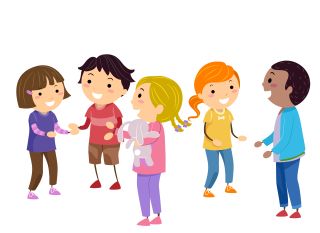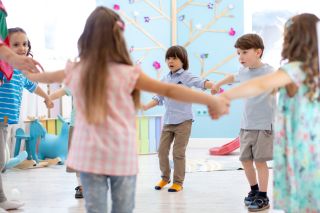Autism
Should Autistic Children Be 'Trained' to Socialize?
The controversy around social skills programs.
Posted August 31, 2023 Reviewed by Jessica Schrader
Key points
- Healthy relationships require authenticity.
- Social skills "training" focused on teaching kids to look neurotypical can be harmful.
- It is up to everyone to work on taking others' perspectives, not just neurodivergent people.
One afternoon, I received an email from a doctor with a therapy request for a mother/daughter pair: “Self-esteem issues, anger, and resentment towards mother’s decisions she feels have adversely affected her life.” The daughter, Maya, was a beautiful, 20-something autistic college student; her mother was single, working full-time, and devoted to raising a neurodivergent daughter.
Maya’s parents had emigrated to the United States before Maya was born, and then her father left the family when she was 8. Maya's primary complaint, however, was her mother's decision to put her in social skills classes when she was young.
Maya had developmental delays as a toddler and was placed in ESL classes until she was identified as autistic. It was harder for an immigrant family to get a proper diagnosis, and her speech delays were often attributed to a language barrier. The special education system is a minefield to navigate, and it is usually highly educated white people with the resources to tackle it. Later, Maya would say she had felt discriminated against by her peers, and it took her a long time to trust anyone before she let them in.
Each session, Maya would protest, “I didn’t want to go to social skills. Why didn’t anyone leave me alone? I don’t care about being liked. I want to be understood.”
Maya hated the pressure in social skills classes to make friends with one another. It was difficult in real time to understand what others were thinking about her and expecting. She preferred to read books or watch children’s shows about making friends and then practice with her dolls on her own terms.
Her mother was remorseful and shared how listening to the experts seemed the right thing to do.
Maya’s reply was always the same, “Did anyone ask me what I wanted?”

Years later, when my son was referred for social skills, I decided to do a deep dive into the topic. In the autism community, there are often different camps, and this was no exception.
On one side are parents of autistic children who are pained by their children’s social rejection and want to give them tools to be socially successful, as well as autistic adults who say they wished they’d had guidance to navigate the complexities of a social world they couldn’t decode.
On the other is perhaps a long overdue re-evaluation of the efficacy of social skills “training.”
Most social skills programs are designed to teach neurotypical communication, thus encouraging “masking,” or suppressing one’s autistic traits. This modality further empowers the dominant culture to dictate the “correct” way to be. These programs make assumptions about “appropriate” and “inappropriate” behavior, often prioritizing eye contact, which can be overstimulating and even painful for autistic people and makes it difficult to take in auditory information.
One widely used social skills curriculum encourages modifying one’s behavior to ensure others don’t have “weird” thoughts about you. It puts the responsibility on the neurodivergent person to make others comfortable and emphasizes the importance of what non-autistic people think. Healthy relationships require authenticity.
Many traditional social skills programs also provide rote scripts that teach autistic kids what to say in given situations. Research shows that it is not the content of what autistic people say but how they present themselves that creates negative first impressions in neurotypical people (Sasson, 2017). No amount of social scripting will change how autistic people show up, and masking autistic traits comes at a significant emotional cost, leading to depression, anxiety, and suicidal ideation (Bradley et al., 2021). Passing as neurotypical should not be what determines self-worth.
The Therapist Neurodiversity Collective, an online group, talks about the dehumanizing nature of social skills training. Julie Roberts, its founder and an autistic speech pathologist, states, “The true lesson of training social skills teaches our students that unless they successfully mask their autistic traits, they are inherently less valuable members of the human race. Social skills training communicates conditional acceptance based on the conditions that non-autistic people determine” (Roberts, 2020).
Roberts does not, however, see a problem targeting perspective-taking goals, which “may include teaching children and teens to understand how and why neurotypical peers and adults act the way they do in various settings and situations” (Roberts, 2020). The autistic person can decide if they choose to use this knowledge. The key is consent and self-determination. In addition, she advises a neurodiversity acceptance educational program that targets awareness and acceptance among peers, employees, and family members.
The latter suggestion addresses the double empathy problem, a theory by autistic British researcher Damian Milton, who shows that social communication is only problematic when you put neurotypical and neurodivergent people together. Their different lived experiences make it difficult to empathize with one another. On their own, each group seems to socialize just fine. However, the onus is always on the neurodivergent group to learn the dominant paradigm rather than communication being a two-way street.

So how can we help autistic children make friends?
Many autistic therapists and parents are open to the idea that there are ways to create neurodiversity-affirming groups that are safe and sensory-friendly and teach interpersonal effectiveness, self-advocacy, conflict resolution, and problem-solving. A select few companies offer neurodiversity-affirming social skills programs created by autistic people that help children and teens understand their own communication styles and embrace who they are. Creating a positive identity and embracing their neurodiversity are some of the essential values.
A few years later, I checked in with Maya. During a college semester abroad, she interacted best with other students through a WhatsApp group chat, where she could use Google Translate to have conversations that felt more natural than in-person. However, she did say it was easier to interact with other autistic peers because she did not have to worry about how she would come across. “I’m still learning about myself. I still want to respect the (social) rules,” she told me. “But I also want to be treated fairly.”
She sent me a term paper she wrote titled “The Medicalization of Introversion.” She cited research on the importance of choice on when and how people spend time together. The research validated her experience that being forced to socialize led to the strongest "negative association with episodic (experiential) subjective well-being" (Uziel et al., 2022).
Ultimately, an equitable society is based on all sharing responsibility for mutual understanding.
References
Sasson NJ, Faso DJ, Nugent J, Lovell S, Kennedy DP, Grossman RB. Neurotypical Peers are Less Willing to Interact with Those with Autism based on Thin Slice Judgments. Sci Rep. 2017 Feb 1;7:40700. doi: 10.1038/srep40700. PMID: 28145411; PMCID: PMC5286449.
Bradley L, Shaw R, Baron-Cohen S, Cassidy S. Autistic Adults' Experiences of Camouflaging and Its Perceived Impact on Mental Health. Autism Adulthood. 2021 Dec 1;3(4):320-329. doi: 10.1089/aut.2020.0071. Epub 2021 Dec 7. PMID: 36601637; PMCID: PMC8992917.
Roberts, J. (2020,February 15). Why Perspective-Taking and Neurodiversity Acceptance? (Part 2 of "Training" Social Skills is Dehumanizing: The One with the Therapy Goals).Therapist Neurodiversity Collective. therapistndc.org/why-teach-perspective-taking-neurodiversity-acceptance/
Uziel, L., & Schmidt-Barad, T. (2022). Choice matters more with others: Choosing to be with other people is more consequential to well-being than choosing to be alone. Journal of Happiness Studies: An Interdisciplinary Forum on Subjective Well-Being. Advance online publication. https://doi.org/10.1007/s10902-022-00506




